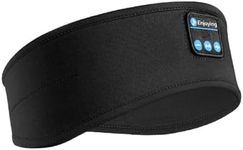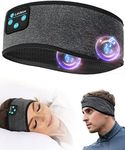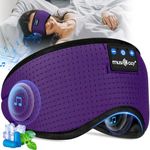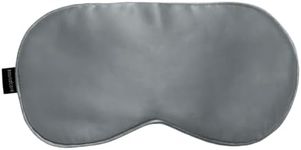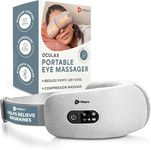Buying Guide for the Best Sleep Headphones
Choosing the right sleep headphones can significantly improve your sleep quality by providing comfort and blocking out unwanted noise. When selecting sleep headphones, it's important to consider various factors that will ensure you get the best fit for your needs. Here are some key specifications to look out for and how to navigate them to make an informed decision.ComfortComfort is crucial when it comes to sleep headphones because you'll be wearing them for extended periods while lying down. Look for headphones made from soft, breathable materials that won't cause discomfort or irritation. Consider whether you prefer in-ear, on-ear, or headband-style headphones, as each type offers different levels of comfort. If you sleep on your side, low-profile designs or headbands may be more suitable.
Sound QualitySound quality is important for ensuring that the audio is clear and pleasant to listen to. While you don't need studio-quality sound for sleep headphones, you should look for a balanced sound profile with good clarity. If you enjoy listening to music or white noise, ensure the headphones can deliver a decent bass and treble. For those who prefer podcasts or audiobooks, clear mids and highs are essential.
Noise Isolation/Noise CancellationNoise isolation and noise cancellation are features that help block out external sounds, which can be particularly useful if you live in a noisy environment. Noise isolation relies on the physical design of the headphones to block out noise, while noise cancellation uses technology to actively reduce ambient sounds. If you need complete silence, active noise cancellation might be the better option, but for general use, good noise isolation can be sufficient.
Battery LifeBattery life is a key consideration if you opt for wireless sleep headphones. You want a pair that can last through the night without needing a recharge. Look for headphones with a battery life of at least 8-10 hours to ensure they won't die in the middle of the night. If you listen to audio for extended periods, longer battery life will be more convenient.
ConnectivityConnectivity options include wired and wireless (Bluetooth) headphones. Wireless headphones offer more freedom of movement and are generally more comfortable for sleeping, as there are no cables to get tangled in. However, wired headphones don't require charging and can be a good option if you don't want to worry about battery life. Consider your preference for convenience versus the need for constant power.
DurabilityDurability is important because sleep headphones need to withstand regular use and the potential wear and tear of being used in bed. Look for headphones with sturdy construction and high-quality materials. Check user reviews to see if there are any common issues with durability. If you plan to use them nightly, investing in a more durable pair can save you money in the long run.
Ease of UseEase of use includes how simple it is to operate the headphones, especially in the dark. Look for headphones with intuitive controls that are easy to access and use without needing to see them. If you choose wireless headphones, ensure the pairing process is straightforward. Consider how easy it is to clean and maintain the headphones, as hygiene is important for items used close to your skin.



